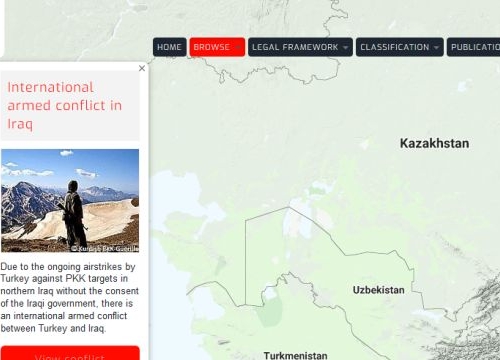RULAC: Update on the International Armed Conflict in Northern Iraq between Iraq and Turkey


Geneva Academy
9 June 2020
Due to the ongoing airstrikes by Turkey against Kurdistan Workers’ Party (PKK) targets in northern Iraq – carried out without the consent of the Iraqi government – there has been an international armed conflict (IAC) between Turkey and Iraq since 2007.
The Turkish military operations in northern Iraq are an extension of the ongoing non-international armed conflict in Turkey between the Turkish armed and security forces and the PKK.
Our Rule of Law in Armed Conflict (RULAC) online portal has been monitoring this IAC by providing an overview of the conflict, information about its classification as an IAC, the parties to the conflict, and applicable international law.
The RULAC entry on this conflict has been updated with an analysis of the situation and its evolution since the beginning of the conflict back in 2007, as well as developments in 2020 as the fighting continues in spite of COVID-19.
Ongoing Turkish Strikes in Northern Iraq
In 2020, Turkey has continued to conduct military operations against the PKK in Iraq, with notably two air strikes in March and April and a drone attack in April near the Makhmour refugee camp, leaving three civilian women dead.
The Turkish Defense Ministry affirmed that Turkey will continue its operations in the region ‘until the last terrorist is neutralized’.
Classification of the Situation as an IAC
While the Iraqi government has always condemned the Turkish airstrikes in its territory, there has been no explicit condemnation of Turkey’s operations since February 2019, which goes hand in hand with an improvement of the relations between the two countries.
‘The only exception is a summon issued by Iraq’s Ministry of Defense to the Turkish ambassador in Baghdad on 27 January 2019 and a request to end Ankara’s unilateral military action in relation to Turkish airstrikes on civilian areas on 23 and 25 January 2019’ explains Dr Chiara Redaelli, Research Fellow at the Geneva Academy.
‘Overall, from the publicly available information and the rejection by Iraq of Turkey’s repeated incursion into its territory, the actions of Turkey trigger an IAC as defined under common Article 2 (1) of the Geneva Conventions. This being said, it should be noted that neither Turkey nor Iraq have publicly stated that they are involved in an IAC. In any case, this is not a condition for the existence of an IAC’ she adds.








